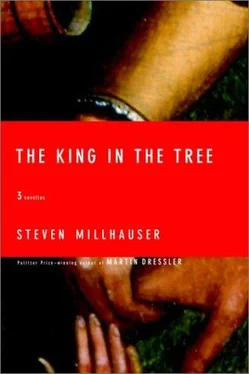More tea?
Now this, too, may surprise you. My first thought was: Oh, no! Poor Robert! Not him ! I mean, Robert, whose harshest word after amateur was ba nal —accent on the last syllable, to give it the true French stink. I could hear him mocking it all, in that way of his. Adultery, for Chrissake, in suburbia, for Chrissake. Doesn’t the poor sap have a sense of style? Pure kitsch, kiddo. Right up there with busts of Beethoven and bookmarks with Emily Dickinson poems printed on them. And so forth. Poor Robert! What a sad falling off. And so, creature of habit that I was, I wanted to comfort him, the poor man. I mean there he was, sitting all doomed and sort of crumpled and. . and ba nal , so of course the only thing you want to do is reassure your husband, while at the same time it’s dawning on you what he’s actually said, and there’s a panic starting somewhere because this handsome man with his doomed look has gone and done something bad to you, if only you could stop comforting him and start concentrating long enough to figure out just what it unbearably is.
I suppose I should have told you the house is haunted. Well, of course. All houses are haunted. It’s just that some are more haunted than others. Robert’s ghost is sitting right there, where you’re sitting now, and my ghost is sitting here, listening to his strangled confession. The air is full of ghosts. At night you can hear them: sifting through the house, like sand.
I said nothing. I think he wanted me to say something — to scream at him, to burst into tears. I felt he wanted drama. I lowered my eyes. I could tell I was disappointing him. At the same time I felt threads of fire shooting through me, a wondrous fiery piercing, a kind of. . a kind of exhilaration of misery. I thought I might die, and that dying might be a strange, exciting thing to do. And you know, I felt almost soothed, almost comforted in my private fire, because it protected me from him, from the words he had spoken.
I think I exasperated him. The poor man needed something from me, blame or forgiveness or. . drama, and there I sat, exalted in misery, a saint of suffering. Who knows? When the living have become the dead, who shall speak? There was too much silence in the room. The kitchen was no longer large enough to contain all that silence. It was pushing against the walls, cracking the plaster. I don’t think he intended to say more, but the silence was choking him. He spat out some words, the way you do when someone’s hands are around your neck. He told me things. I said nothing. He told me her name. That’s when I learned it was you.
You seem upset. Of course you ought to be. Of course Robert would have sworn eternal secrecy. I wouldn’t be surprised if he made you prick your finger with a needle and sign a document in blood. Secret love! What could be better? What you failed to understand was Robert’s loyalty. It’s true that by taking you as his — do you mind the word mistress? — he had been disloyal to me. That’s what confused you. Your mistake was to assume that there were two separate facts: a disloyalty, to me, and a new loyalty, to you. No, whatever his feelings might have been for you, his disloyalty to me simply stirred up and even strengthened the old loyalty. He confessed to me because he was loyal and couldn’t do anything about it. He was stuck with it. Robert betrayed you. I want you to know that. It’s something we have in common.
Do you know what else he told me? He told me you were nothing to him. Don’t you say anything. He told me you were a body, just a body. If he was trying to soothe me, he was failing brilliantly. But I want you to know what he said, sitting right there. Just a body. Men can be a little thoughtless sometimes, don’t you think? Of course you can choose not to believe me, if it makes you feel better. Or you can believe that Robert was lying. A good man, lying to spare the feelings of his wife.
But let’s adjourn to the porch, shall we? There’s so much more to tell.
This was all open, when we bought the place. I used to hang a line between these two posts: I remember Robert’s socks dripping onto the handrail. On Robert’s salary and the little I picked up part-time at the library, we had to be careful — a dryer was the last thing we considered necessary. It was the mosquitoes that finally drove us to screen it in. I don’t think it’s too chilly out here, do you? We can sit a little. Sit, why don’t you. I just loved it out here, summer evenings. I’d come out with a book and sit with it facedown in my lap. You can hear a lot of sounds in the summer, and I liked all of them: children’s voices all woven together, a car radio suddenly loud and then fading away, a basketball hitting a driveway with that smacking sound, grackles in the trees — and the crickets, always the crickets, and always the lawn mowers. I used to think of the evening lawn mowers as big summer insects — a sort of bee. Robert never lasted long out here. I think it made him restless. But he always sat for a while, in the summer, to keep me company. Sometimes we’d talk about converting it to a full-time room — windows, heat, I imagined myself sitting out here feeling warm in winter — but my heart wasn’t in it. A porch needs to be open. You need to feel the air and hear the sounds. Don’t you think? The whole idea is to be outside and inside at the same time. That’s what a porch is.
After Robert’s confession, I came out here. Sat right there where you’re sitting now. Who knows what I was thinking? It’s hard to remember things, even the most important things in your life. All you know is that they happened. I sat down. I felt dead. At the same time my mind was very sharp and alert. And this might strike you as odd, but I was in a state of — of surprise. Robert had killed me, a quick stab to the heart, and I’d come out on the porch to watch myself die. Why wasn’t I dead? It did surprise me. Or maybe the dead have their thoughts, as well as the living. Do you think so? My mind, as I said, was very alert. I heard Robert’s words, the words that I knew were going to change my life, and already I was judging them. You see, I heard in his confession a certain — well, a certain pride. He had said his piece — had come to terms with his conscience — he’d acted like a good man. He had performed well. I almost felt like standing up and applauding. Bravo, Robert! Now it was my turn — to act like a good woman. All I had to do was forgive him.
I don’t know how long I sat out here. I remember noticing it had grown dark: a peaceful summer night. At one point I heard Robert’s footsteps in the kitchen. They stopped at the door of the porch, and I knew he was standing there in the dark kitchen, looking at me through that window. Then he went away.
When I first met Robert, when I was twenty-four and he was thirty, he used to come into the bookstore where I was working. He wore jeans and work boots and flannel shirts. He looked like a skinny lumberjack. I thought he was my age — a student, maybe. Even then he was an interesting man. A teacher who hated teachers, an intellectual who made fun of intellectuals, a Jew with no ties to Judaism — unless you count the piano. Robert liked to say that all pianos are Jews. He didn’t sit comfortably in his skin. It’s one of the things that most attracted me to him.
I thought about that time in a dim, puzzled way, as if I’d read about it in some book I could no longer remember.
Then I recalled something that happened once at a party. A loud man was talking to Robert, a little way off. “Good old Robert,” I heard him say, with a friendly laugh. I saw Robert’s face tighten behind his little smile. Later I asked what that was all about. “Oh, he’s a fool,” Robert said. “But even so, he has no right to call me good. ” At the time I thought he was just being — you know, being Robert. But now I wondered about it. Was it possible he wasn’t a good man? Of course I never thought he was a saint. I couldn’t have stood that. Robert was difficult. But I knew him — I knew him. Didn’t I?
Читать дальше












